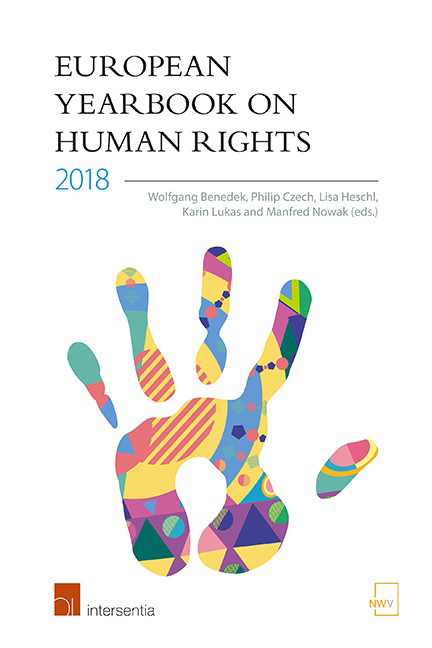Book contents
- Frontmatter
- Scientific Advisory Board
- Editors’ Preface
- Contents
- List of Abbreviations
- List of Contributors
- Part I Topic Of The Year
- Part II Eu
- The Court of Justice of the European Union and Human Rights in 2017
- Understanding Resettlement Through the Prism of Human Rights: A Case Study on the Resettlement in Belgium of Syrian Refugees from Lebanon
- The Decline of Fundamental Rights in CJEU Jurisprudence after the 2015 ‘Refugee Crisis’
- The EU Migration Crisis and the Human Rights Implications of the Externalisation of Border Control
- Does the EU Framework for Roma Integration Promote the Human Rights of Romani Persons in the Union?
- The EU Guidelines on Freedom of Religion or Belief at Their Fifth Anniversary: Implementation Lagging Behind?
- Human Rights Council in Troubled Waters: The EU as a Stabilising Factor
- Part III Coe
- PART IV OSCE
- Part V Others
- Part VI Book Reviews
- Index
Understanding Resettlement Through the Prism of Human Rights: A Case Study on the Resettlement in Belgium of Syrian Refugees from Lebanon
from Part II - Eu
Published online by Cambridge University Press: 31 January 2019
- Frontmatter
- Scientific Advisory Board
- Editors’ Preface
- Contents
- List of Abbreviations
- List of Contributors
- Part I Topic Of The Year
- Part II Eu
- The Court of Justice of the European Union and Human Rights in 2017
- Understanding Resettlement Through the Prism of Human Rights: A Case Study on the Resettlement in Belgium of Syrian Refugees from Lebanon
- The Decline of Fundamental Rights in CJEU Jurisprudence after the 2015 ‘Refugee Crisis’
- The EU Migration Crisis and the Human Rights Implications of the Externalisation of Border Control
- Does the EU Framework for Roma Integration Promote the Human Rights of Romani Persons in the Union?
- The EU Guidelines on Freedom of Religion or Belief at Their Fifth Anniversary: Implementation Lagging Behind?
- Human Rights Council in Troubled Waters: The EU as a Stabilising Factor
- Part III Coe
- PART IV OSCE
- Part V Others
- Part VI Book Reviews
- Index
Summary
ABSTRACT
According to United Nations High Commissioner for Refugees (UNHCR), resettlement is one of the only three durable solutions for refugees. Despite the importance of this practice, little literature offers an in-depth analysis of its inherent challenges. Evidence shows that one of them is the existence of a gap between expectations in the pre-resettlement phase and reality in the post-resettlement phase. This article aims at shedding light on the resettlement practices of the State of Belgium in Lebanon from this particular perspective. Since 2013, Belgium has regularly carried out selection missions with the view to resettling Syrian refugees from Lebanon (SRL). The goal of the research is to highlight the root causes of the gap between their pre-resettlement expectations and their post-resettlement reality. It examines to what extent two factors – the individual factor and the legal factor – contribute to widening it. To this end, both qualitative and quantitative methods of research were used: 291 SRL were surveyed in Lebanon and a series of semi-structured interviews were conducted in Belgium with five resettlement actors (UNHCR, the Federal Agency for the Reception of Asylum Seekers (Fedasil), Commissioner General for Refugees and Stateless Persons (CGRS), Convivial, and Caritas) and ten resettled SRL. The article concludes that the root cause of the discrepancy is both individual and legal in nature: SRL develop unrealistic expectations, mostly due to a lack of knowledge about UNHCR‘s scheme and show low levels of satisfaction with the host country because the latter fails to acknowledge their vulnerability and adopt a human rights approach to resettlement.
INTRODUCTION
With thousands of applications submitted each year, the resettlement programme of the UNHCR is the largest worldwide. Resettlement is defined by UNHCR as ‘ the selection and transfer of refugees from a state in which they have sought protection to a third state which has agreed to admit them with permanent refugee status ‘. For the most vulnerable, it is often a synonym for hope. After being selected for resettlement, refugees find themselves trapped between a painful past they wish to flee and a future they tend to idealise.
- Type
- Chapter
- Information
- European Yearbook on Human Rights 2018 , pp. 75 - 102Publisher: IntersentiaPrint publication year: 2018



